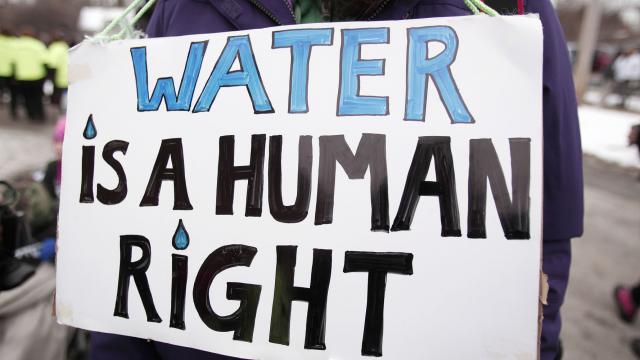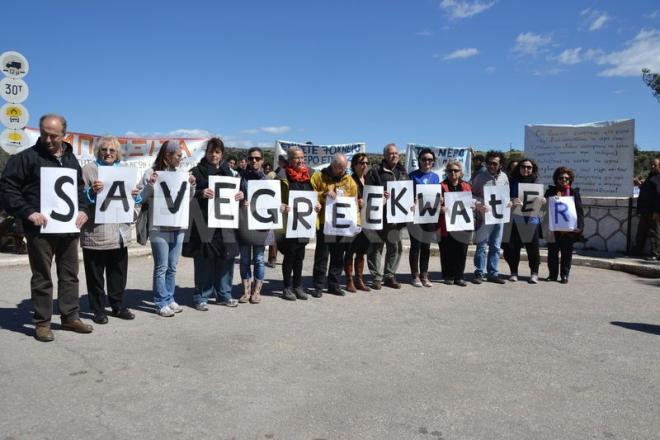
This is Part 7 in a series about Radical Municipalism, looking at ways people worldwide are organizing in their cities to build power from the bottom up. Read Part 1 (Brazil) Part 2 (Rojava), Part 3 (Chiapas), Part 4 (Warsaw), Part 5 (Bologna), Part 6 (Jackson), Part 7 (Athens) and Part 8 (Warsaw & New York), Part 9 (Reykjavík), and Part 10 (Argentina).
Neoliberal institutions, including the Greek state and the European Union, are busy trying to sell off Greece's municipal water services. "We are being colonized by outside forces. We are no longer in charge of our own economic affairs," an anonymous Greek water activist told Andreas Bieler, a political economy professor from University of Nottingham, U.K.
"Water wars" are becoming a more regular result as corporations aim to privatize public services, including the most precious one, water. In Europe, 62 million people lack basic sanitation and 14 million don't have clean drinking water. Globally, 663 million lack access to safe water.
History shows that water privatization often leads to disastrous result for the public. For instance, in Bucharest, water privatizations caused a twelvefold price rise. In Greece – which has faced austerity-on-steroids since 2010, as EU-imposed cuts to public spending have driven the country into a humanitarian crisis – privatization and asset stripping have driven the story.
But momentum is shifting globally. 835 public services, including 267 water services, have returned to public hands this century, as documented by the Transnational Institute. These are all examples of remunicipalization, in which cities and locales are taking back their services rather than allowing them to remain centralized, national public bodies.
The same is even true in Greece, where counter-power and municipalization are holding back neoliberalism's march.
Why Greece is Trying to Sell Itself to the Lowest Bidder
Since 2010, Greece has been on the sharp end of an austerity and privatization regime imposed by the European Union and IMF as a condition of its bailout loans. All this despite the fact that the country's debt is illegitimate.
Debt crises are not a new way to subject countries to neoliberal discipline. Similar structural adjustment policies have been inflicted on the global South since the 80s. Other European countries are self-inflicting this policy, even when it's not imposed on them from outside. The E.U. specifically encourages a water privatization agenda by supporting a bureaucratic architecture where water is regulated as a commodity in markets.
"While privatizations have been a pillar of Greece’s bailouts since 2010, they have raised proceeds of just 5 billion euros, rather than a targeted 50 billion euros, mainly due to the crisis, political and union resistance and bureaucracy," Reuters reported.
Keeping Athens's and Thessaloniki's Water Public
The water movement and municipalism greatly compliment Greece's union resistance. Greece's water war focuses on EYDAP [Athens] and EYATH [Thessaloniki] water companies, which were proposed for partial sale in 2010 and full sale in 2012.
The Syriza government under Alexis Tsipras went even further. It tried to prevent EYDAP from taking on new employers – a classic tactic, and act of sabotage, to enable privatization for a failing public body. Yet, as the third memorandum ends in August 2018, only 11 percent of EYDAP and roughly a quarter of EYATH will ultimately be privatized.
Many social movements stalled these sell-offs. When Thessaloniki's EYATH was put out for tender, a citizens union initiative stepped forward among the usual corporate bidders. Initiative-136 offered that every water user would own their own water company. The bid failed, but it challenged the fundamentalist neoliberal narrative, instead promoting social justice and the right to water.
In 2014, Thessaloniki also held a municipal referendum in which 98 percent voted to keep the water public, once again breaking the dominant argument for privatization. Both Initiative-136 and the referendum grew out of a broad network, including new unions combining citizens and workers, the locally impacted municipalities and organizations like Not the Water and Water Warriors. The next step for Initiative-136 is to form a cooperative aimed at buying the 24 percent privatized share and making the water utility into a cooperative.
Cities Grew on Public Water, and Can Again
Thessaloniki declared water as a human right in June 2018, joining the Blue Cities municipal network that includes European capitals from Paris to Berlin to Bern, Switzerland. The Greek water movements also took the issue of human water rights to the Supreme Court, which paused and lessened the privatization momentum.
Across the E.U., the networks working on municipalization and unions have successfully gathered 1.9 million signatures to recognize water as a human right. The initiative has not blocked the E.U. from supporting water privatization, but the pressure is down.
Considering water as a human right undermines neoliberal ideology. It also fits the goals of Radical Municipalism, when we look both words' Latin origins: Radix means roots, and Municeps refers to free town. Even if we go back to the roots of cities – to Ancient Athens or further back – these cities were literally built above springs. No city was ever built on a privatized water provision.
This is not academic. Municipalization offers a third way for cities. It agrees that nationalization is often inefficient, corrupt and bureaucratic. Yet it also provides a way for people to control their own services, avoiding privatization, which largely compounds and expands the problems of state-run services.
Municipalizing public services reflects 19th century practice, when modern cities co-developed the water infrastructure that multinationals are today trying to exploit for profit. The cities that have reclaimed their water under public control include Paris and Berlin. If a city the size of Paris can do it, it's hard to argue big business is necessary anywhere in this sector. But it doesn't stop corporations from trying.
Veolia and Suez are the two giant French companies that lost their contracts in Paris. Beyond France, these firms are busy trying to privatize water around the globe, for instance in India, another front in the global water war.
The movement to reclaim public control of water is also flowing strong in Catalonia, Spain, where the city of Terrassa recently succeeded and many nearby cities are close to reclamation. Again a convergence of activists, unions, radical city councils, councils working together and the broader European alliance is enabling this change. But Terrassa shows how dirty water companies will fight. The mayor, who administered the popular decision to remunicipalize the city's water, stepped down due to a campaign of fear, defamation and intimidation he says was orchestrated by the water company.
Turning back to Greece, the final word on water privatization may change, as it has done through interventions from both sides. But as Prof. Bieler reported, even if companies increase their holding of water rights, unionized water workers and citizens who regard water as an essential commons will fight on. Rebel cities are not just built on many powerful ideas: They are built on the power of many people. As one Athenian worker said, imagining a future of privatized and expensive water: "In a starving society, it is our obligation not to cut such essential services as water."
Read Part 1 (Brazil) Part 2 (Rojava), Part 3 (Chiapas), Part 4 (Warsaw), Part 5 (Bologna), Part 6 (Jackson), Part 7 (Athens) and Part 8 (Warsaw & New York), Part 9 (Reykjavík), and Part 10 (Argentina).



















